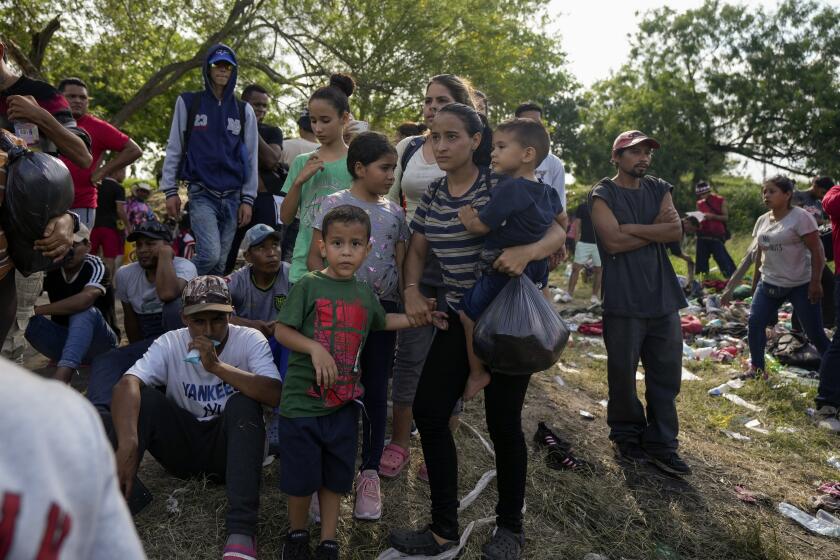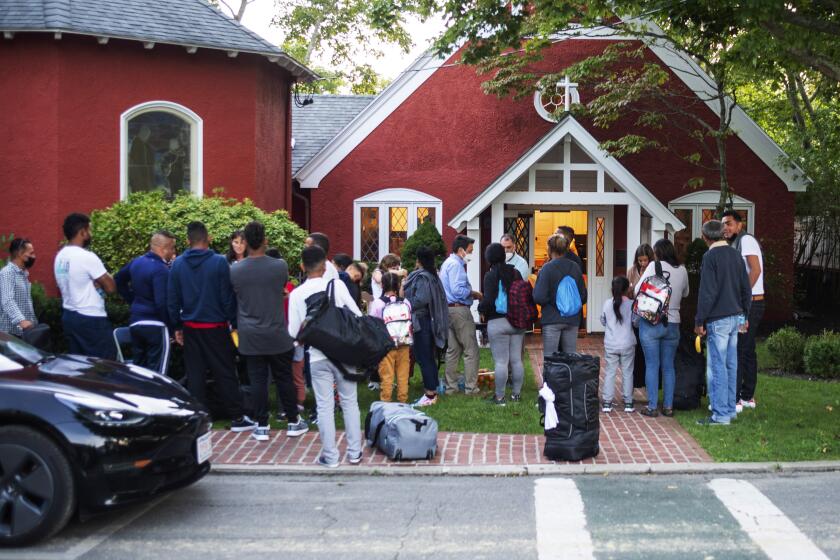Sanctuary cities are working just fine, thank you

- Share via
When Republican Govs. Greg Abbott of Texas and Ron DeSantis of Florida bused and flew migrants to Los Angeles, New York, Washington, D.C., and other so-called “sanctuary cities,” they might have envisioned they were exporting the same chaos as border states have experienced as they grapple with a historic number of migrants. They wanted leaders in these cities to admit they were wrong about their immigrant-friendly policies.
Earlier this month, Abbott sent migrants on a bus to Los Angeles. And DeSantis has admitted he dispatched migrants on two chartered flights to Sacramento a few days earlier, luring them with false promises of housing, shelter and legal help.
But Abbott and DeSantis are mistaken if they think they are teaching cities with sanctuary polices any lessons with their inhumane political stunts or causing their leaders to rethink their commitment to not treating migrants as criminals.
Those governors and their political allies also seem to be confused about what it means when cities have sanctuary policies. Though policies vary, providing sanctuary means not turning migrants over to federal immigration authorities simply for being in the country illegally. It means treating them like humans in need rather than pawns.
Whoever is responsible for flying a dozen political asylum seekers to California, they ought to be shamed for exploiting desperate people for political gamesmanship.
That’s what leaders in Los Angeles, Sacramento and other “sanctuary cities” did as buses and planes dumped dozens of tired and often confused migrants on their doorsteps in recent months. They rallied attention and resources, while religious and other nonprofit organizations stepped up to welcome the migrants with shelter, food and clothes. In some instances, these migrants have even found temporary jobs, illustrating the need for their labor.
Abbott and DeSantis may also not realize that sanctuary policies were designed to help law enforcement keep communities safe. Sanctuary policies were developed because police in many cities such as Los Angeles were frustrated because undocumented immigrants were not reporting crimes or stepping forward as witnesses for fear of deportation.
Critics say these sanctuary cities have laws and policies that shield criminals and obstruct federal immigration policies. But cities with sanctuary policies have lower than average crime rates, higher household incomes and lower poverty rates, according to various studies.
Local authorities did not refuse to cooperate with immigration enforcement, as critics claim. They simply limited the role of local law enforcement in immigration cases, for example, by not using local police to do immigration checks or by not holding an undocumented immigrant in custody for a few extra days to serve federal authorities’ schedules.
It’s shameful that desperate people fleeing violence and deep poverty are being treated like political pawns.
Los Angeles is in the midst of transitioning from a “city of sanctuary” to “sanctuary city.” The difference is more than just semantics. The former designation is little more than a statement by city leaders in 2017 that they opposed then-President Trump’s dehumanizing anti-immigrant policies, which included separating young children from their parents. Some of those children have yet to be reunited with their parents years later. Earlier this month, the City Council voted to strengthen the policy by banning city personnel or resources from being used for immigration enforcement.
It’s true that the transports of migrants by the Texas and Florida governors have been inconvenient to cities such as Washington and New York, which have had to scramble to find housing and other resources. But they haven’t done a thing to undermine the foundation on which sanctuary policies were built.
More to Read
A cure for the common opinion
Get thought-provoking perspectives with our weekly newsletter.
You may occasionally receive promotional content from the Los Angeles Times.







